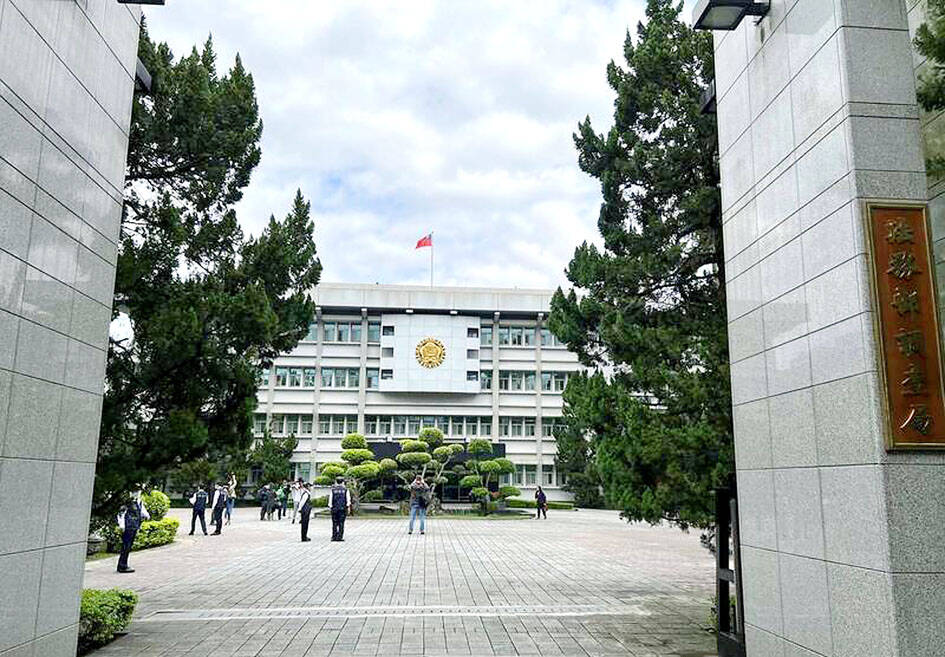China simultaneously employed cognitive warfare while conducting military drills around Taiwan on Monday, the Ministry of Justice Investigation Bureau insinuated yesterday
The Chinese People’s Liberation Army (PLA) early on Monday launched military drills code-named “Joint Sword-2024B” involving its army, navy, air and rocket forces in the Taiwan Strait and areas to the north, south and east of Taiwan. They ended at 6pm.
The bureau said it had found several false reports online, such as untrue assertions of Taiwan’s military failing to respond quickly and that ships carrying liquefied natural gas had been forced to turn around.

Photo: Taipei Times
The messages formed “cognitive manipulation” by “overseas hacking armies,” who hacked social media pages, the bureau said in a statement, without directly blaming China.
The bureau reminded the public to secure their social media accounts and verify information online to avoid falling victim to cognitive manipulation.
Separately, a National Security Bureau report to the Legislative Yuan said that the Chinese Communist Party (CCP) has stepped up measures to increase pressure on Taiwan and sow internal division since President William Lai’s (賴清德) inauguration ceremony on May 20.
Beijing’s inclusion of the China Coast Guard in its military drills was aimed at increasing the exercises’ force projection, the report said.
China is also attempting to “squeeze” Taiwanese farmers by weaponizing the economy and highlighting that selling agricultural produce to China pays better, the report said.
Diplomatically, China is stepping up efforts to malign and distort UN Resolution 2758 and emphasize that it is the only legitimate government of China to deter Taiwan’s participation in international bodies, it added.
The CCP has issued “22 guidelines” designed to punish “die-hard” Taiwanese separatists, hoping to suppress any mention of Taiwanese independence, the report said.
Beijing is encouraging the Chinese public sector to “prettify” China’s ideology through short videos on the Internet so that more Taiwanese would recognize the validity of CCP rule, it said.
The CCP is also augmenting its cyberwarfare capabilities by hacking the government to paralyze its Web sites, conducting digital corporate espionage and using artificial intelligence technology to strengthen its “united front” rhetoric, the report said.
The bureau said it would work with partners to foster joint security and, with the help of international like-minded partners, step up efforts to gather intelligence on critical decisions made by the CCP and the PLA.
Additional reporting by Reuters

ENDEAVOR MANTA: The ship is programmed to automatically return to its designated home port and would self-destruct if seized by another party The Endeavor Manta, Taiwan’s first military-specification uncrewed surface vehicle (USV) tailor-made to operate in the Taiwan Strait in a bid to bolster the nation’s asymmetric combat capabilities made its first appearance at Kaohsiung’s Singda Harbor yesterday. Taking inspiration from Ukraine’s navy, which is using USVs to force Russia’s Black Sea fleet to take shelter within its own ports, CSBC Taiwan (台灣國際造船) established a research and development unit on USVs last year, CSBC chairman Huang Cheng-hung (黃正弘) said. With the exception of the satellite guidance system and the outboard motors — which were purchased from foreign companies that were not affiliated with Chinese-funded

PERMIT REVOKED: The influencer at a news conference said the National Immigration Agency was infringing on human rights and persecuting Chinese spouses Chinese influencer “Yaya in Taiwan” (亞亞在台灣) yesterday evening voluntarily left Taiwan, despite saying yesterday morning that she had “no intention” of leaving after her residence permit was revoked over her comments on Taiwan being “unified” with China by military force. The Ministry of the Interior yesterday had said that it could forcibly deport the influencer at midnight, but was considering taking a more flexible approach and beginning procedures this morning. The influencer, whose given name is Liu Zhenya (劉振亞), departed on a 8:45pm flight from Taipei International Airport (Songshan airport) to Fuzhou, China. Liu held a news conference at the airport at 7pm,

Taiwan was ranked the fourth-safest country in the world with a score of 82.9, trailing only Andorra, the United Arab Emirates and Qatar in Numbeo’s Safety Index by Country report. Taiwan’s score improved by 0.1 points compared with last year’s mid-year report, which had Taiwan fourth with a score of 82.8. However, both scores were lower than in last year’s first review, when Taiwan scored 83.3, and are a long way from when Taiwan was named the second-safest country in the world in 2021, scoring 84.8. Taiwan ranked higher than Singapore in ninth with a score of 77.4 and Japan in 10th with

GRIDLOCK: The National Fire Agency’s Special Search and Rescue team is on standby to travel to the countries to help out with the rescue effort A powerful earthquake rocked Myanmar and neighboring Thailand yesterday, killing at least three people in Bangkok and burying dozens when a high-rise building under construction collapsed. Footage shared on social media from Myanmar’s second-largest city showed widespread destruction, raising fears that many were trapped under the rubble or killed. The magnitude 7.7 earthquake, with an epicenter near Mandalay in Myanmar, struck at midday and was followed by a strong magnitude 6.4 aftershock. The extent of death, injury and destruction — especially in Myanmar, which is embroiled in a civil war and where information is tightly controlled at the best of times —